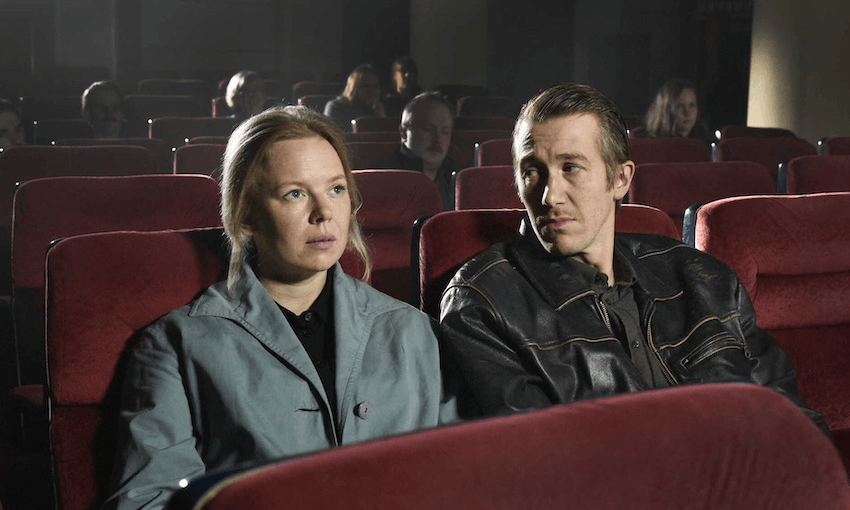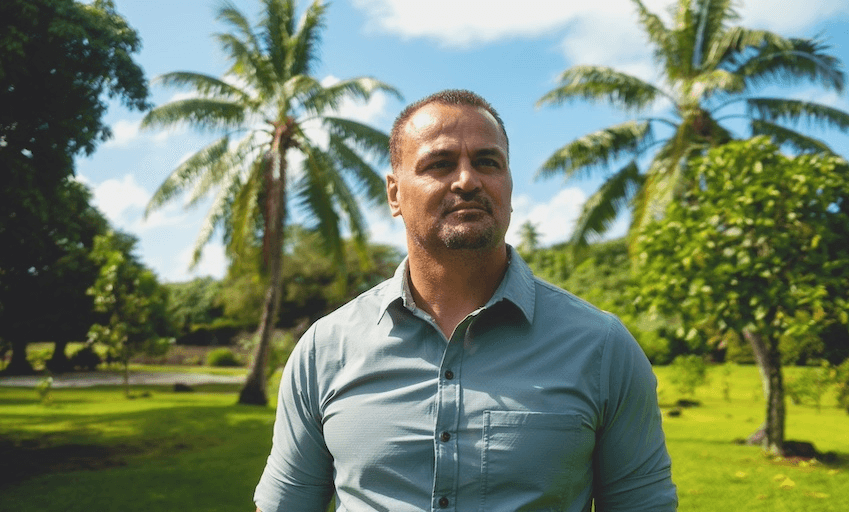A fresh film festival programme is coming to a coffee table near you, featuring 129 films that all sound really good in their write-up. Here are 10 worth paying particularly close attention to.
Whānau Mārama: New Zealand International Film Festival has once again rolled around, and with it comes a kaleidoscope of exciting global cinema. This year, the festival’s 54th edition begins in Auckland, opening with Justine Triet’s Palme d’Or winning Anatomy of a Fall on the 19th of July. The following two months will see the festival tour Aotearoa visiting 16 towns and cities.
After a tumultuous few years, which included Covid-19 disruptions, the death of long-time director Bill Gosden and the resignation of Marten Rabarts after only two years at the helm, Whānau Mārama: New Zealand International Film Festival will also return to its regular format, running across three weekends in all major centres.
From melancholic love stories to gripping thrillers and beguiling comedies, there’s something for everyone in this year’s jam-packed programme of 129 buzzworthy films. To help you decide which ones are worth seeking out, I’ve scoured it from cover-to-cover to bring you this, my top 10 must-sees.
Fallen Leaves
Director: Aki Kaurismäki
After a brief-retirement, Finland’s most-renowned filmmaker Aki Kaurismäki returns to cinema with Fallen Leaves, a charming deadpan comedy about two lost souls. Awarded the Jury Prize at the Cannes Film Festival, the film sees lonely supermarket worker Ansa meet the equally lonely Holappa, an alcoholic security guard – their romance blossoms and stumbles, evoking a rare sense of play that is sure to delight. Often preoccupied with those marginalised or estranged from society, Kaurismäki fuses the aesthetics of social realism with ironic devices, showcasing a wonderfully singular and non-serious approach to filmmaking. At a brief 81 minutes, Fallen Leaves promises to be a gentle crowd-pleaser that will warm your heart despite its ice-cold Helsinki setting.
Past Lives
Director: Celine Song
Playwright Celine Song makes her film debut with Past Lives, an achingly beautiful story of childhood sweethearts reconnecting after decades apart. The film, already being labelled “The Best of 2023” by some, has a steadily growing fandom – a TikTok trend has appeared of fans recording themselves before and after Past Lives. Tears are aplenty as Nora and Hae Sung, classmates drawn to each other but torn apart, enter each other’s lives again. Evoking “In Yun”, a Korean concept of fate and predestination, this decades-spanning romance reconfigures what an American film is. Think Before Sunrise or Eternal Sunshine of the Spotless Mind, framed by the experience of a Korean-American immigrant who asks, “What if I stayed?”
The New Boy
Director: Warwick Thornton
Since his 2009 feature debut Samson and Delilah, Thornton has emerged as one of Australia’s foremost indigenous filmmakers. His first film in six years, The New Boy, sees the Kaytetye director tell a story of religious colonisation in rural 1940s Australia – a young aboriginal boy arrives at a monastery run by a renegade nun in the dead of night. The nun, played by the ever spellbinding Cate Blanchett, marks the first time the two titans of Australian cinema have worked together. Despite Blanchett’s maverick status, the extraordinary Aswan Reid, in his debut role, steals the show as a boy with magical faith-healing abilities. Inspired by Thornton’s experience at a monastic boarding school and his rejection of Christianity, The New Boy is set to be an illuminating vision of the tension that denotes the Indigenous Australian experience.
Bread and Roses
Director: Gaylene Preston
To mark 100 years of women’s suffrage in Aotearoa, Gaylene Preston directed the 3-hour epic Bread and Roses, a stunning tribute to the activist Sonja Davies. Released in 1993 in both television form and as a film, Bread and Roses is a landmark film that stands alongside Jane Campion’s An Angel at My Table, Peter Jacksons Heavenly Creatures and Lee Tamahori’s Once Were Warriors as shining examples of Aotearoa cinema from the 90s. Remastered ahead of its 30th anniversary for this year’s Whānau Mārama: New Zealand International Film Festival, Bread and Roses was described by Bill Gosden as “a richly developed, highly detailed and beautifully realised piece of work” upon its initial festival release. Now remastered, the film and Davies are ready to crystallise and capture the attention of the next generation of filmmakers, activists, unionists and visionaries.
Ms. Information
Director: Gwen Isaac
For many, myself included, scientist Siouxsie Wiles and her pink hair were a comforting presence and a regular source of information during the hysteria of Covid-19. Her leadership during the pandemic, despite being targeted by various conspiracy groups, has Wiles, in this fly-on-the-wall documentary, candidly asking what “is the world’s problem with women like me?” In charting Wiles’s professional and personal life during the first two years of Covid-19, Ms. Information looks set to be an enlightening watch on a pivotal moment in Aotearoa’s history.
Loop Track
Director: Tom Sainsbury
If you’re familiar with the who’s who of Aotearoa television and cinema, you’ll know Tom Sainsbury. He garnered national fame in 2017 as the “Snapchat Dude” and has been a regular on the smash-hit Wellington Paranormal. Now Sainsbury and Chillbox Creative, frequent collaborators on the 48Hours film competition, are behind Loop Track, a low-budget horror comedy set in the isolated bush of Aotearoa. As the director, writer, producer and star of the film, Sainsbury describes its genesis as originating from a single image: “someone on an isolated bush walk seeing a figure in the far distance. They can’t make out exactly what they’re looking at, but the figure’s presence feels malevolent.” Self-cast as an anxious man named Ian, one fright away from another nervous breakdown, Sainsbury’s latest project is sure to terrify and tickle.
How to Have Sex
Director: Molly Manning Walker
If there was one film out of the Cannes Film Festival that my Twitter timeline wouldn’t shut up about, it was Molly Manning Walker’s debut feature How to Have Sex. Videos of the British director went viral as she charged in late to an award ceremony, having left the city not expecting to win anything. Greeted by thunderous applause, Walker ran down the aisle and onto the stage to claim the Un Certain Regard prize, the top award at the festival sidebar.
Set on the party island of Malia in Crete, three British teenage girls are embarking on their first unaccompanied holiday abroad, trying hard to forget the exams they’ve just taken. Tara and Sky aren’t virgins, but Em hopes this trip brings more than platonic encounters; she’s on a quest for sex. The neon-drenched aesthetic and the boundless displays of hedonism by drunken holidaymakers invites comparisons to Spring Breakers, but How to Have Sex has a different heart. It’s an unflinching look at the anxieties surrounding female sexual desire which makes this kinetic debut feature a must-watch.
How to Blow Up a Pipeline
Director: Daniel Goldhaber
This explosive thriller is partly inspired by Andreas Malm’s 2021 book of the same name, which argues that climate activists and the “commitment to absolute non-violence” should be abandoned. Protests, petitions and shared Instagram infographics have changed nothing; the agency to save our dying planet is slipping away. In How to Blow Up a Pipeline, an intriguing change of pace from Goldhaber’s previous feature Cam, a group of young activists plans to blow up a pipeline in West Texas.
The film’s content has drawn dozens of warnings from North American law enforcement agencies, with the FBI sending out a bulletin stating that How to Blow Up a Pipeline has the “potential to inspire threat actors to target oil and gas infrastructure with explosives or other destructive devices.” The film doesn’t actually provide a guide on how to commit such acts; rather, it serves as a razor-sharp battle cry for a generation of environmental activists enraged by the dawdling pace of change. Mix in thrilling genre elements from heist films such as Ocean’s Eleven, Reservoir Dogs, Thief and Rififi and you’ve now got the signs of an instant classic.
Orlando, My Political Biography
Director: Paul B. Preciado
Cinema that tells the varied stories of trans and non-binary people often focuses on tragedy. Paul B. Preciado’s reinterpretation of Virginia Woolf’s novel Orlando: A Biography, however, is a fun and inventive allegory for those who don’t fit within society’s construct of gender. Preciado organises a casting and brings together 26 contemporary trans and non-binary people, from 8 to 70 years old, who embody and play the part of Orlando. By blurring the lines between reality and fiction, this docudrama deconstructs the fiction of gender, powerfully speaking to Woolf herself to say, “Look! Here we are!”
Late Night with the Devil
Directors: Colin Cairnes, Cameron Cairnes
Each year Ant Timpson and his “Incredibly Strange” sidebar promises a delight of cinematic provocations. This year is no different, with Late Night with the Devil being a standout for those who love the unease of the supernatural. Australian genre titans Colin and Cameron Cairnes’ latest eerie endeavour breathes new life into the found-footage horror. A love letter to talk shows and 1970’s horror films, Late Night with the Devil sees a live television broadcast go disturbingly wrong when it unleashes evil into America’s living rooms. Harkening back to the satanic panic, this inventive horror has the chameleonic David Dastmalchian playing a Merv Griffin type talk show host. Struggling to garner more viewers, on Halloween 1997, he decides to put on a special hair-raising show inviting a psychic, a sceptic, and a girl possibly possessed by the devil. The tapes of what ensued had been lost… until now.



